The AMD Ryzen 5 1600X vs Core i5 Review: Twelve Threads vs Four at $250
by Ian Cutress on April 11, 2017 9:00 AM ESTBenchmarking Performance: CPU Web Tests
One of the issues when running web-based tests is the nature of modern browsers to automatically install updates. This means any sustained period of benchmarking will invariably fall foul of the 'it's updated beyond the state of comparison' rule, especially when browsers will update if you give them half a second to think about it. Despite this, we were able to find a series of commands to create an un-updatable version of Chrome 56 for our 2017 test suite. While this means we might not be on the bleeding edge of the latest browser, it makes the scores between CPUs comparable.
SunSpider 1.0.2 [link]
The oldest web-based benchmark in this portion of our test is SunSpider. This is a very basic javascript algorithm tool, and ends up being more a measure of IPC and latency than anything else, with most high performance CPUs scoring around about the same. The basic test is looped 10 times and the average taken. We run the basic test 4 times.
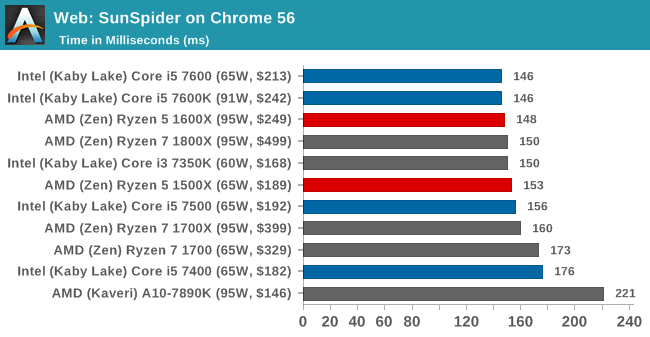
Mozilla Kraken 1.1 [link]
Kraken is another Javascript based benchmark, using the same test harness as SunSpider, but focusing on more stringent real-world use cases and libraries, such as audio processing and image filters. Again, the basic test is looped ten times, and we run the basic test four times.
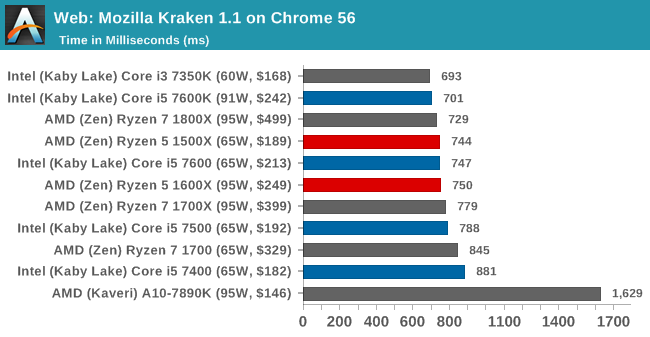
Google Octane 2.0 [link]
Along with Mozilla, as Google is a major browser developer, having peak JS performance is typically a critical asset when comparing against the other OS developers. In the same way that SunSpider is a very early JS benchmark, and Kraken is a bit newer, Octane aims to be more relevant to real workloads, especially in power constrained devices such as smartphones and tablets.
WebXPRT 2013 and 2015 [link]
While the previous three benchmarks do calculations in the background and represent a score, WebXPRT is designed to be a better interpretation of visual workloads that a professional user might have, such as browser based applications, graphing, image editing, sort/analysis, scientific analysis and financial tools. Web2013 is the older tool, superceded by Web2015, however both still are highly relevant for high-performance web applications today.
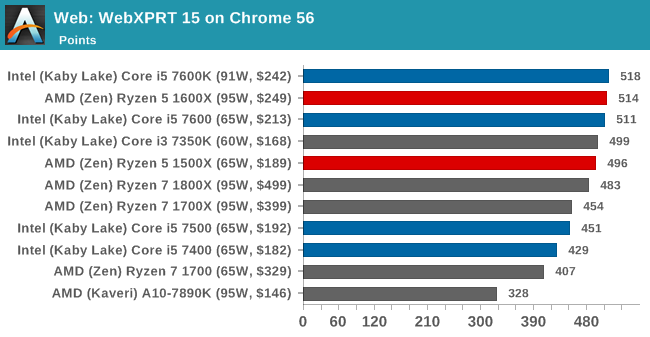


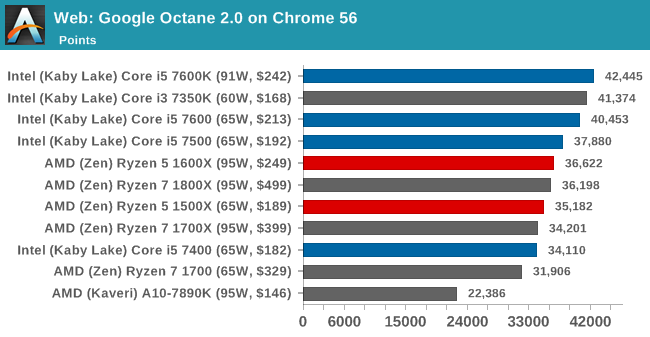
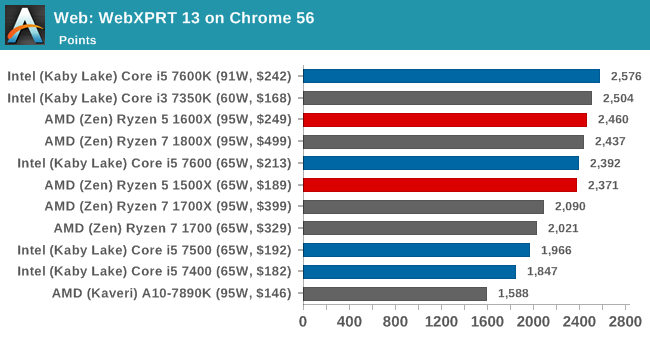








254 Comments
View All Comments
lefty2 - Tuesday, April 11, 2017 - link
Yeah, also with the RX 480 the i5 7400 scores better then i5 7600 (by a huge margin)! That makes no sensesharrken - Wednesday, April 12, 2017 - link
AdoredTV did a very interesting video about exactly this issue, called "Ryzen of the Tomb Raider". In pretty extensive testing they show that something is definitely wrong with Nvidia cards in DX12 on Tomb Raider.https://www.youtube.com/watch?v=0tfTZjugDeg
On a Ryzen 1800X system, crossfire RX 480's beat out an overclocked Titan X, 90fps on the 480's and only 80fps on a Titan X - which is just ridiculously wrong when you look at the relative GPU power.
Some other people have run more tests, and a similar thing is happening in The Division, so it seems highly likely that Nvidia has some strange issues somewhere along the line with DX12.
https://www.reddit.com/r/Amd/comments/62n813/inspi...
milli - Wednesday, April 12, 2017 - link
It's also happening in Battlefield 1, Deus Ex: MD & Total War: W.https://www.computerbase.de/2017-03/amd-ryzen-1800...
Are nVidia drivers not detecting Ryzen CPU's correctly or is it foul play?
mdw9604 - Thursday, April 13, 2017 - link
Poor AVX implementation /w AMD and the driver.milli - Thursday, April 13, 2017 - link
What has AVX to do with nVidia's DX12 drivers???bug77 - Tuesday, April 11, 2017 - link
Really great job not throwing intel power consumption in there for comparison. /sIan Cutress - Tuesday, April 11, 2017 - link
Mainly because that part of the discussion was purely to do with CCX arrangement and core loading.But sure, because you asked so nicely. /s They've been added.
bug77 - Tuesday, April 11, 2017 - link
Thanks.Phiro69 - Tuesday, April 11, 2017 - link
Could you comment on your Chromium Compile benchmark a bit; I'd like to use it as part of a pitch on why our compile farm needs replacing (e.g. "look what a $249 cpu can do").What OS did you build under, I'm guessing Windows 10 from your earlier statements in the full article?
Did you follow these directions for the most part? https://chromium.googlesource.com/chromium/src/+/m...
If so (and you used Windows 10), then you used Visual Studio? Which version and which license of VS?
Thanks! Great review!
Ian Cutress - Tuesday, April 11, 2017 - link
Win 10 x64 Pro v1607, Build 14393.953. VS Community 2015.3 with Win10 SDK. I bascially followed the instructions in that link. :)